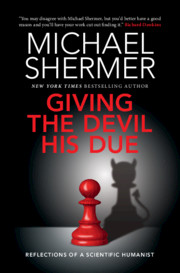Book contents
- Giving the Devil His Due
- Giving the Devil His Due
- Copyright page
- Dedication
- Contents
- Acknowledgments
- Introduction Who Is the Devil and What Is He Due?
- Part I The Advocatus Diaboli: Reflections on Free Thought and Free Speech
- Part II Homo Religiosus: Reflections on God and Religion
- Chapter 7 E Pluribus Unum for All Faiths and for None
- Chapter 8 Atheism and Liberty
- Chapter 9 The Curious Case of Scientology
- Chapter 10 Does the Universe Have a Purpose?
- Chapter 11 Why Is There Something Rather Than Nothing?
- Part III Deferred Dreams: Reflections on Politics and Society
- Part IV Scientia Humanitatis: Reflections on Scientific Humanism
- Part V Transcendent Thinkers: Reflections on Controversial Intellectuals
- Notes
- Index
Chapter 7 - E Pluribus Unum for All Faiths and for None
The Case for Belief Pluralism
from Part II - Homo Religiosus: Reflections on God and Religion
Published online by Cambridge University Press: 28 February 2020
- Giving the Devil His Due
- Giving the Devil His Due
- Copyright page
- Dedication
- Contents
- Acknowledgments
- Introduction Who Is the Devil and What Is He Due?
- Part I The Advocatus Diaboli: Reflections on Free Thought and Free Speech
- Part II Homo Religiosus: Reflections on God and Religion
- Chapter 7 E Pluribus Unum for All Faiths and for None
- Chapter 8 Atheism and Liberty
- Chapter 9 The Curious Case of Scientology
- Chapter 10 Does the Universe Have a Purpose?
- Chapter 11 Why Is There Something Rather Than Nothing?
- Part III Deferred Dreams: Reflections on Politics and Society
- Part IV Scientia Humanitatis: Reflections on Scientific Humanism
- Part V Transcendent Thinkers: Reflections on Controversial Intellectuals
- Notes
- Index
Summary
The impact of idealized myths of femininity, including the trope of woman-as-nation, is addressed through embodied mythmaking as a consideration of the reiteration, reperformance and reinscription of myths on and through the body. Stasis and containment define violent mythmaking, yet the chapter also looks to the possibility of myth’s liberating and utopian function. Counter to the unhomely experience which marks woman’s displacement outside of culture, the introduction proposes the potential for women’s mythmaking to reconceive spaces, myths, and theatrical forms which accommodate female expression. The assertion of a creative female corporeality redresses scholarly neglect of female bodies; both their creativity and their histories. The introduction addresses the overarching question of this book, namely how to ‘house’ the body of women’s work in Irish theatre, and proposes a new paradigm, the genealogy, as a means of remodelling our understanding of the development of Irish theatre. Deploying a feminist genealogy enables the assertion of a coalition of women in Irish theatre united by their unhomely experience and mobilized through the collective action of embodied mythmaking.
Keywords
- Type
- Chapter
- Information
- Giving the Devil his DueReflections of a Scientific Humanist, pp. 81 - 85Publisher: Cambridge University PressPrint publication year: 2020

